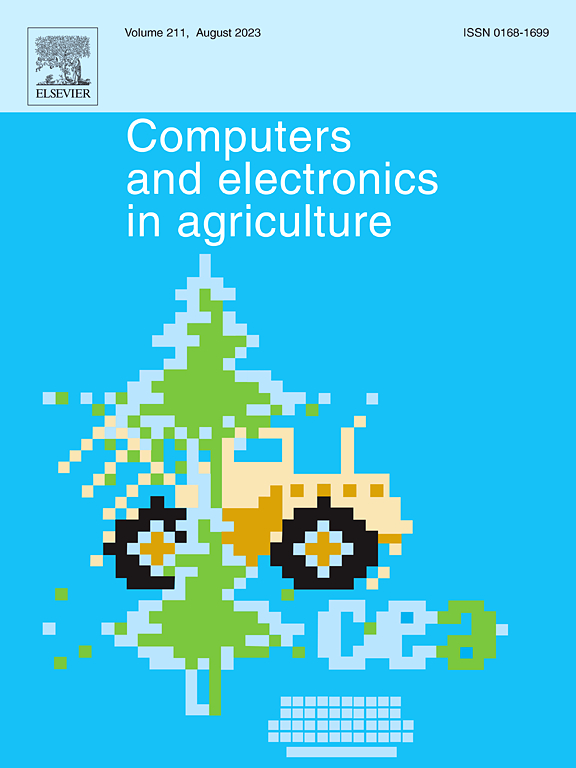基于双曲模糊加权零不一致与组合距离评估相结合的农业 4.0 决策支持系统评估
IF 7.7
1区 农林科学
Q1 AGRICULTURE, MULTIDISCIPLINARY
引用次数: 0
摘要
农业 4.0 通过彻底改变城市粮食系统,在塑造可持续城市和社会方面发挥着至关重要的作用。通过融合精准农业、垂直园艺和数据分析等先进技术,农业 4.0 提高了本地粮食产量,减少了粮食运输,并优化了资源利用。本文介绍了一种利用多标准决策(MCDM)评估农业 4.0 决策支持系统(ADSS)的创新方法,为选择能够推动智能农业可持续发展的最佳系统做出了重要贡献。这项研究的新颖之处在于开发了一个综合评估框架,该框架扩展了用于标准加权的双曲模糊加权零不一致方法,并结合了基于组合距离的评估方法,用于对 ADSS 进行基准评估。评估矩阵根据八个关键标准对 13 个 ADSS 进行了评估,包括 "可访问性"、"重新规划"、"专家知识"、"互操作性"、"可扩展性"、"不确定性和动态因素"、"预测和预报 "以及 "历史数据分析"。双曲模糊加权零不一致方法的结果突出表明,"重新规划"(0.143)和 "预测和预报"(0.140)是最重要的标准,而 "专家知识 "排名最低(0.113)。在基于距离的组合评估中,"OCCASION "系统得分最高(3.843),是最有利的 ADSS,而 "基于 MOLP 的牛肉供应链 "系统得分最低(-3.519)。使用不同权重集进行的敏感性分析证实了所建议方法的稳健性和可靠性。这项研究提供了一个强大的决策工具,可以指导利益相关者选择最佳的 ADSS,最终促进农业 4.0 的可持续性和资源优化。研究结果对农民、农业企业和智能农业具有重要意义,表明该方法具有在关键领域加强决策过程的潜力。本文章由计算机程序翻译,如有差异,请以英文原文为准。
Evaluating agriculture 4.0 decision support systems based on hyperbolic fuzzy-weighted zero-inconsistency combined with combinative distance-based assessment
Agriculture 4.0 plays a crucial role in shaping sustainable cities and societies by revolutionizing urban food systems. By incorporating advanced technologies like precision farming, vertical gardening, and data analytics, Agriculture 4.0 improves local food production, reduces food transportation, and optimizes resource utilization. This paper introduces an innovative approach using Multi-Criteria Decision Making (MCDM) to assess Agriculture 4.0 Decision Support Systems (ADSS), contributing significantly to the selection of optimal systems that can drive sustainability in smart agriculture. The novelty of this research lies in developing a comprehensive evaluation framework that extends the hyperbolic fuzzy-weighted zero-inconsistency method for criteria weighting, combined with the combinative distance-based assessment method for benchmarking ADSS. The assessment matrix evaluates 13 ADSS across eight key criteria, including “accessibility,” “re-planning,” “expert knowledge,” “interoperability,” “scalability,” “uncertainty and dynamic factors,” “prediction and forecast,” and “historical data analysis”. Results from the hyperbolic fuzzy-weighted zero-inconsistency approach highlight “re-planning” (0.143) and “prediction and forecast” (0.140) as the most significant criteria, while “expert knowledge” ranked lowest (0.113). In the combinative distance-based assessment, the system labelled “OCCASION” achieved the highest score (3.843), positioning it as the most favourable ADSS, whereas the “MOLP-based beef supply chain” system scored lowest (−3.519). Sensitivity analysis, conducted using varying sets of weights, confirms the robustness and reliability of the proposed approach. This research provides a powerful decision-making tool that can guide stakeholders in selecting the best ADSS, ultimately promoting sustainability and resource optimization in Agriculture 4.0. The findings have important implications for farmers, agribusiness, and smart agriculture, demonstrating the potential of the methodology to enhance decision-making processes in a critical sector.
求助全文
通过发布文献求助,成功后即可免费获取论文全文。
去求助
来源期刊

Computers and Electronics in Agriculture
工程技术-计算机:跨学科应用
CiteScore
15.30
自引率
14.50%
发文量
800
审稿时长
62 days
期刊介绍:
Computers and Electronics in Agriculture provides international coverage of advancements in computer hardware, software, electronic instrumentation, and control systems applied to agricultural challenges. Encompassing agronomy, horticulture, forestry, aquaculture, and animal farming, the journal publishes original papers, reviews, and applications notes. It explores the use of computers and electronics in plant or animal agricultural production, covering topics like agricultural soils, water, pests, controlled environments, and waste. The scope extends to on-farm post-harvest operations and relevant technologies, including artificial intelligence, sensors, machine vision, robotics, networking, and simulation modeling. Its companion journal, Smart Agricultural Technology, continues the focus on smart applications in production agriculture.
 求助内容:
求助内容: 应助结果提醒方式:
应助结果提醒方式:


